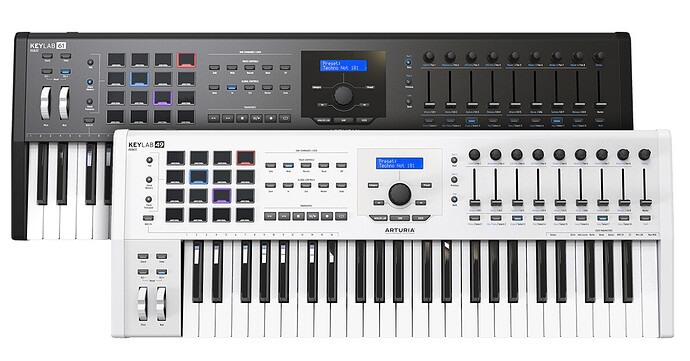What light-touch, synth keybeds do people here prefer?
Years ago, I had a Juno 60, and I loved it’s light, soft feel. I’ve got a Kurzweil PC-88 (Fatar), which serves me well on the piano side. A few years ago, I bought an Akai MPK49, which is a fine, functional controller, but I find it to be almost unplayable. When I bought it, I figured that I would adapt. I didn’t. “Repulsive” is too strong a word, but I am not drawn to play it and once playing, I want to stop.
The problems for me (others might love the feel, that’s good! Personal tastes vary) are that the spring is too strong and the keys (relative to the fulcrum) are too short. The black keys are 3-inches long, compared to 3-1/2” on the Kurzweil. When I play at the top of a black key, especially with my middle finger, it often doesn’t depress. I’m right on top of the hinge, and with the strong spring, this means that I need much more force than expected.
The quality isn’t bad. The key shape is okay and the side to side wiggle is so-so. The plastic doesn’t feel overly cheap. So I’m not slagging the Akai. It’s a good value. It’s just that the feel doesn’t suit me.
So… anything out there with full length, light touch keys that is responsive? (If the spring is too light, the recovery could be sluggish.) The Juno 60 was rocket fast to play, once you get used to the light touch.
I can judge the other features easily enough just by looking at the controls and jacks. Gig performer let’s me program the cool stuff there, so long as the knobs and switches are solid and reliable.
For extra credit, I have a couple of Yamaha FC7 expression pedals. Compatibility would be nice. The industry doesn’t help us know this before we buy. (The Akai is not fully compatible.)
My budget is, say, up to $500, but could stretch for the right model. ($300 would be better!) 49 keys. USB and MIDI. Roland, Novation, and Alturia are obvious candidates, and I’m open to others. Light, small, and rugged for solo gigs would be ideal. (Wait… light and rugged?)
As an aside, I think marketing drew people to heavy springs. Fully weighted and hammers are expensive. Light springs are cheap. By using heavier springs, keyboards could be marketed as ‘semi-weighted”, which tricked buyers into thinking they were better than synth/spring weighted. (This is different than the semi-weighted keys of traditional electro-mechanical organs.) Oh well.
All recommendations appreciated! My only local music store is Guitar Center, and they have almost no keyboards on the floor.

